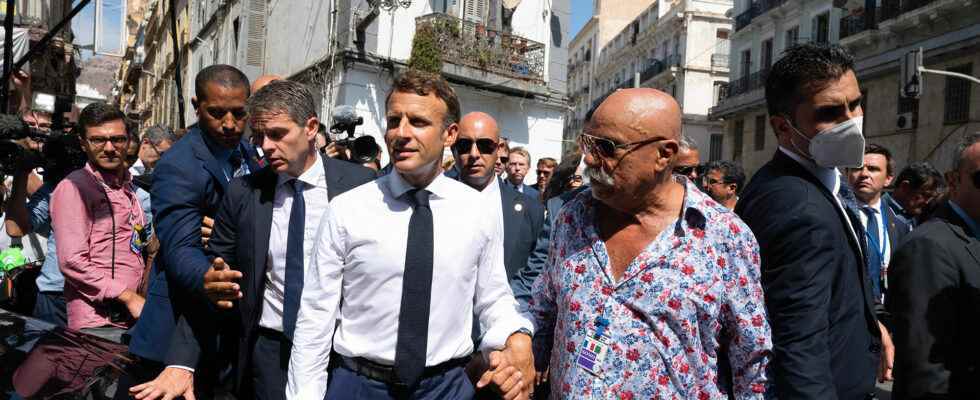A climb to the Christian sanctuary of Santa Cruz, then a dive into the world of raï, punctuated by an electric walkabout: in Oran, Emmanuel Macron crossed paths with several worlds, witnesses of the colonial past and the vitality of the second city of ‘Algeria.
At the release of the raï music label Disco Maghreb, a few Oranais gathered. Others film the president from their balcony. The Head of State rushes into his car, the procession sets off, framed by Algerian security.
A street further, the car slows down, the president gets out, shakes hands. “Mr. Macron”, “Mr. President”, “hello”, shouts the crowd that presses around him, mobile phone in hand to immortalize the moment, according to images on social networks.
Walkabout improvised by Emmanuel #Macron in the streets of Oran. “One two three, long live the#Algeria » chant the inhabitants @franceinfo pic.twitter.com/Hl3KLQB7sx
— Guillaume Daret (@GuillaumeDaret) August 27, 2022
“One two three Long live Algeria”, she chants in a festive atmosphere. The president smiles, waves in the fray. Then the atmosphere is electrified, security blocks behind him. The Algerian police ask him to get back in his car. He waves to the crowd one last time.
The morning had started on a more conventional note. When the presidential motorcade arrives at the top of Santa Cruz, the French president discovers a breathtaking view of the bay of Oran.
A military fort from the Spanish era overlooks the site, which later became a place of pilgrimage during French colonization.
At Ascension, the faithful went up “by the thousands, partly on their knees” towards the chapel, in “fervor and Mediterranean piety”, says the Archbishop of Algiers, Jean-Paul Vesco, to the president while strolling in a open-air church.
Mgr Vesco also tells of the attachment of the Pieds-noirs to this place. “It was the focal point of the Europeans in Algeria,” he said. When they left, at independence in 1962, they rebuilt a sanctuary of Santa Cruz in Nîmes where pilgrims continued to flock each year.
“Unhappy Always”
Today, about forty religious still live in the diocese of Oran. Two hundred Spanish migrants and students now make up the bulk of the Christian community.
One of the two sisters still present, a discreet little lady with white hair, approaches the president. She tells him about her birth in Algeria, a life spent in this country, as a sister and teacher, and the upcoming return to France, to Nancy. “You will come back!” he whispers, taking her hand.
“I was born there, I grew up there, my family has been here since 1841. Everyone left in 1963,” she told AFP.
“It was hard for them afterwards, with the arrival in France. They were told to go back home. Here it went very well. Here I am at home. Now my superiors are asking me to return,” says she with emotion.
A few steps away, the infamous harbor of Mers-el-Kebir recalls another high point in the history of France: the attack on the French Navy by the Royal Navy in July 1940 so that the buildings would not fall between the hands of Nazi Germany.
An hour later, a change of scenery: Emmanuel Macron discovers the outdated decor of the raï label Disco Magreb, in a shop, where hundreds of K7s are piled up.
In an overheated atmosphere given the narrowness of the premises, the Head of State, in shirt sleeves, glass of tea in hand, inquires about the titles on a Cheb Hasni cassette. “There is only one title in French. Unhappy always!”, he laughs, before specifying that he still has a “manager-discs and a radio-cassette”.
The place is now a museum, but the label continues to unearth new talent. “It marked the people of my generation”, remembers the writer Kamel Daoud, alongside the president.
